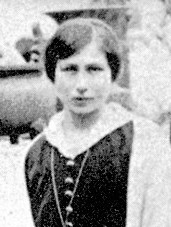In "Auroville — The City Of Dawn in South India" (27 February 2009)
Sayings
Mirra Alfassa: Zitate auf Englisch
On developing her inner experiences, as narrated in later years to her disciples at Sri Aurobindo Ashram, in "Birth and Girlhood", also in The Mother On Herself http://www.miraura.org/bio/herself.html
Her entry in her diary when she left Pondicherry and on the tumultuous developments in the world for the War, quoted in "Diary notes and Meeting with Sri Aurobindo" and also in IV. Diary Notes And Meeting With Sri Aurobindo http://www.motherandsriaurobindo.org/Content.aspx?ContentURL=/_staticcontent/sriaurobindoashram/-04%20Centers/India/Pondicherry/Sri%20Aurobindo%20Society/Wilfried/The%20Mother%20-%20A%20Short%20Biography/007_Diary%20Notes%20and%20Meeting%20with%20Sri%20Aurobindo.htm, p. 21
When she was attacked by a serious fever epidemic which had engulfed Japan in 1917 and this occult experience was widely publicized after the epidemic had abated, quoted in "Japan (1916-20)", also in “Yogi-doctors” and Occult Healing Arts:Towards a Post-colonial Anthropology of Holistic Therapeutics at Sri Aurobindo Ashram http://www.isa-sociology.org/publ/E-symposium/E-symposium-vol-1-1-2011/EBul-Mar-11-Paranjape.pdf., p. 8
Her views on the ancient art of Samurai, quoted in "Japan (1916-20)", also in The Modern Review, Volume 23 by Ramananda Chatterjee (1918) http://books.google.co.in/books?id=fa4mAQAAIAAJ, p. 69
On her feelings during stay in Japan, quoted in "Japan (1916-20)" and also in On the Mother: The Chronicle of a Manifestation and Ministry by K. R. Srinivasa Iyengar (1 January 1995) http://books.google.co.in/books?id=WIPXAAAAMAAJ, p. 160
After having read a French translation of the Bhagavad Gita given to her by an Indian who had “advised her to envisage Krishna as the immanent Godhead, as the Divine within ourselves, quoted in "Paris (1897-1904)", and in II. PARIS (1897-1904), Sri Aurobindo's Ashram http://www.motherandsriaurobindo.org/Content.aspx?ContentURL=_staticcontent/sriaurobindoashram/-04%20centers/india/pondicherry/sri%20aurobindo%20society/wilfried/The%20Mother%20-%20A%20Short%20Biography/-005_Paris%20(1897-1904).htm.
Reprting about developments after the descent of over mind into the physical, quoted in "Pondicherry", also in The Mother: The Story of Her Life by Georges Van Vrekhem (2004) http://books.google.co.in/books?id=8hgG8aweqncC&pg=RA1-PT107, p. 107
In The Formation Of The Ashram http://www.searchforlight.org/Sriaurobindo_Ashram1.htm, also in VII. The Formation of The Ashram http://www.sriaurobindoashram.com/Content.aspx?ContentURL=/_StaticContent/SriAurobindoAshram/-04%20Centers/India/Pondicherry/Sri%20Aurobindo%20Society/Wilfried/The%20Mother%20-%20A%20Short%20Biography/-010_The%20Formation%20of%20the%20Ashram.htm pp.39-40
On her opinion given to the Priest who was on his way to China as a missionary, quoted in "Diary notes and Meeting with Sri Aurobindo" and also in The Mother: The Story of Her Life by Georges Van Vrekhem (2004) http://books.google.co.in/books?id=8hgG8aweqncC&pg=RA1-PA40, p. 40
On her return to Pondicherry in April 1920 accompanied by an English lady, Miss Dorothy Hodgeson, after she had refused an offer by Rabindranath Tagore to take charge of Shantiniketan, his educational institute, quoted in "Japan (1916-20)", in [ Chapter 14 Second Coming, K R Srinivas Iyengar http://sriaurobindoashram.com/Content.aspx?ContentURL=_staticcontent/sriaurobindoashram/-09%20e-library/-03%20Disciples/K%20R%20Srinivas%20Iyengar/On%20The%20Mother/-16_Second%20Coming.htm, p. 202
At the young age when she started developing her developing interest in occultism, quoted in "Birth and Girlhood". Also in 125th Birth Anniversary of The Mother, 21st February, 2003 by Mother (2003) http://books.google.co.in/books?id=gX7XAAAAMAAJ, p. 4
Her observations in 1917 on the immense vitality of the Japanese during the war, quoted in "Japan" (1916-20)
How she felt when she sat down at the feet of Sri Aurobindo, quoted in "Diary notes and Meeting with Sri Aurobindo" and also in The Mother (of Sri Aurobindo Ashram) Prema Nandakumar of National Book Trust, India, (1977) http://books.google.co.in/books?id=R1sqAAAAYAAJ, p. 23
In Birth and Girlhood http://www.searchforlight.org/TheMother_lifeSketch1.htm, during her childhood days in when she was aware of her special purpose of life, her mission on earth, and also in On the Mother Divine by Pasupati Bhattacharya (1968) http://books.google.co.in/books?id=1loqAAAAYAAJ, p. 10
“For four years, from an artistic point of view, I lived from wonder to wonder.”
On her four years stay in Japan from March 1916, quoted in Japan (1916- 1920) http://www.searchforlight.org/TheMother_lifeSketchpart5.htm
In her preface to the book "Prieres et Meditations" which was translated into English by Sri Aurobindo, quoted in "Diary notes and Meeting with Sri Aurobindo."
Sayings
When she met Sri Aurobindo for the first time with her husband Richards at rue Fransçois Martin at Pondicherry, quoted in "Diary notes and Meeting with Sri Aurobindo", and also in Biblio, Volume 3 Asia-Pacific Communication Associates, (1998) http://books.google.co.in/books?id=tC9VAAAAYAAJ, p. 33
“The Best way to express one's gratitude to the Divine is to feel simply happy.”
In "Paris (1897-1904)", also in Words of The Mother Sri Aurobindo Ashram, (1987) http://books.google.co.in/books?id=ljoqAAAAYAAJ, p. 163
Sayings
Quoted in "Diary notes and Meeting with Sri Aurobindo", also in The Spirituality of the Future: A Search Apropos of R. C. Zaehner's Study in … by Kaikhushru Dhunjibhoy Sethna (1 January 1981) http://books.google.co.in/books?id=dYKjb9EMqjIC&pg=PA72, p. 72
Sayings
Quoted in "Pondicherry", and also in The Mother: The Story of Her Life by Georges Van Vrekhem (2004) http://books.google.co.in/books?id=8hgG8aweqncC&pg=RA1-PT107, p. 107
On artists whom she had often found of rather loose morals, quoted in "Paris (1897-1904)" and in Mother India, Volume 20 (1968) http://books.google.co.in/books?id=YifkAAAAMAAJ, p. 46
“If ever I leave my body, my consciousness will remain with you.”
In "Auroville — The City Of Dawn in South India" (27 February 2009)
Sayings
“Consciousness, to be sure, is more effective than packets of medicine.”
Her final comment on her experience of getting out of the epidemic, quoted in "Japan" (1916-20)
As quoted in "Paris (1897-1904)", and in Bulletin, Volume 53 by the Sri Aurobindo International Centre of Education (Pondicherry, India) http://books.google.co.in/books?id=VMzWAAAAMAAJ
When she left Pondicherry on 22 February 1915, when her husband was called home [France] to join the French Reserve Army, quoted in "Diary notes and Meeting with Sri Aurobindo", Sri Aurobindo Circle, Issue 33 by Aurobindo Ghose (1977) http://books.google.co.in/books?id=bcPWAAAAMAAJ, p. 84
Recording her experience in her book “Prayers and Meditations” quoted in "Birth and Girlhood". Also in Sri Aurobindo and the Mother: Glimpses of Their Experiments, Experiences … By Kireet Joshi (1 January 1989) http://books.google.co.in/books?id=wW-_IiNSARgC&pg=PA26, p. 26
In The Mother http://www.auroville.org/vision/ma.htm
Sayings
In "The Formation Of The Ashram", and also in [ The Mother: The Story of Her Life by Georges Van Vrekhem ( 2004) http://books.google.co.in/books?id=8hgG8aweqncC&pg=RA1-PT134&lpg=RA1-PT134, p. 134
